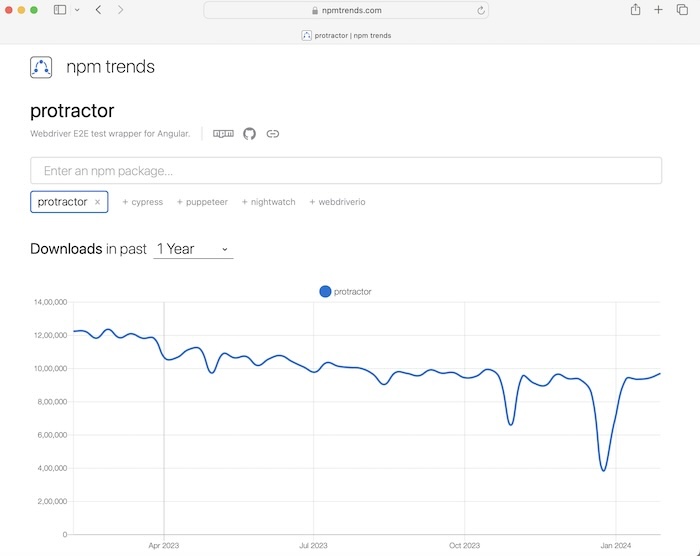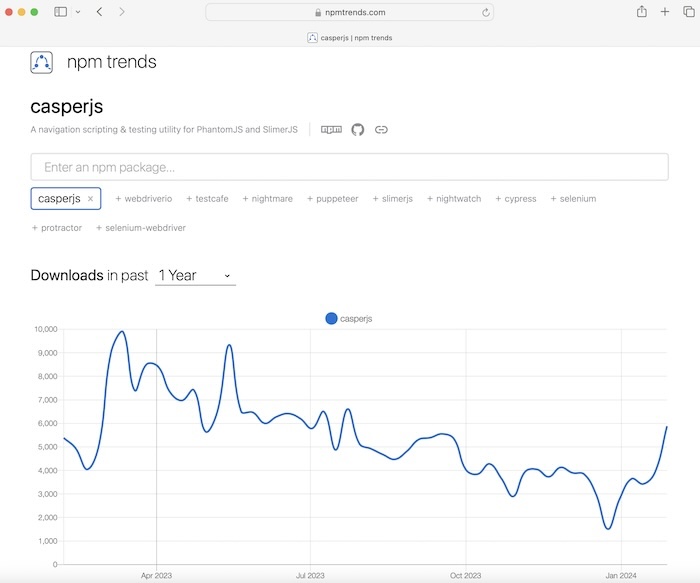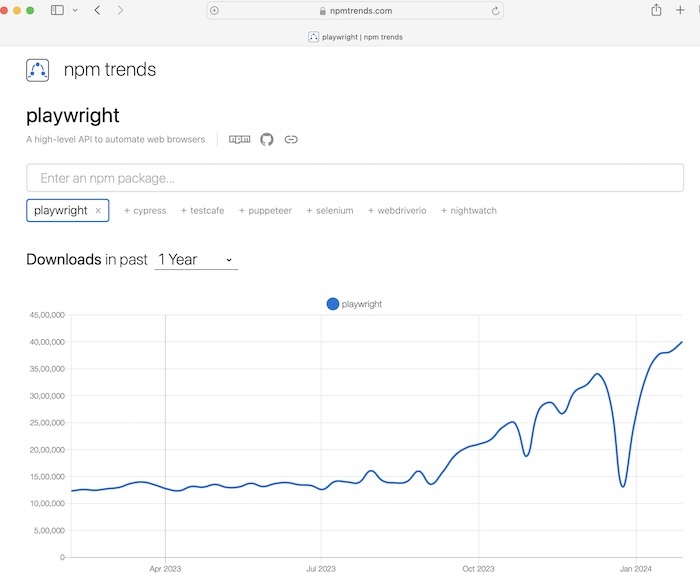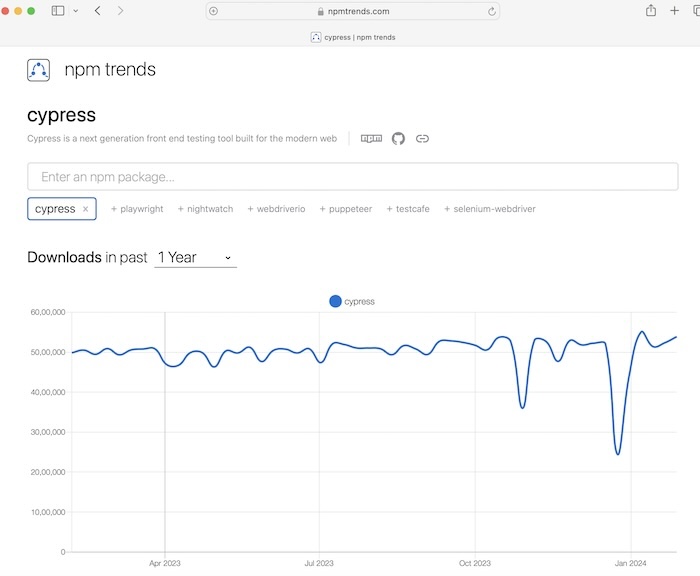
- Selenium - Home
- Selenium - Overview
- Selenium - Components
- Selenium - Automation Testing
- Selenium - Environment Setup
- Selenium - Remote Control
- Selenium - IDE Introduction
- Selenium - Features
- Selenium - Limitations
- Selenium - Installation
- Selenium - Creating Tests
- Selenium - Creating Script
- Selenium - Control Flow
- Selenium - Store Variables
- Selenium - Alerts & Popups
- Selenium - Selenese Commands
- Selenium - Actions Commands
- Selenium - Accessors Commands
- Selenium - Assertions Commands
- Selenium - Assert/Verify Methods
- Selenium - Locating Strategies
- Selenium - Script Debugging
- Selenium - Verification Points
- Selenium - Pattern Matching
- Selenium - JSON Data File
- Selenium - Browser Execution
- Selenium - User Extensions
- Selenium - Code Export
- Selenium - Emitting Code
- Selenium - JavaScript Functions
- Selenium - Plugins
- Selenium WebDriver Tutorial
- Selenium - Introduction
- Selenium WebDriver vs RC
- Selenium - Installation
- Selenium - First Test Script
- Selenium - Driver Sessions
- Selenium - Browser Options
- Selenium - Chrome Options
- Selenium - Edge Options
- Selenium - Firefox Options
- Selenium - Safari Options
- Selenium - Double Click
- Selenium - Right Click
- HTML Report in Python
- Handling Edit Boxes
- Selenium - Single Elements
- Selenium - Multiple Elements
- Selenium Web Elements
- Selenium - File Upload
- Selenium - Locator Strategies
- Selenium - Relative Locators
- Selenium - Finders
- Selenium - Find All Links
- Selenium - User Interactions
- Selenium - WebElement Commands
- Selenium - Browser Interactions
- Selenium - Browser Commands
- Selenium - Browser Navigation
- Selenium - Alerts & Popups
- Selenium - Handling Forms
- Selenium - Windows and Tabs
- Selenium - Handling Links
- Selenium - Input Boxes
- Selenium - Radio Button
- Selenium - Checkboxes
- Selenium - Dropdown Box
- Selenium - Handling IFrames
- Selenium - Handling Cookies
- Selenium - Date Time Picker
- Selenium - Dynamic Web Tables
- Selenium - Actions Class
- Selenium - Action Class
- Selenium - Keyboard Events
- Selenium - Key Up/Down
- Selenium - Copy and Paste
- Selenium - Handle Special Keys
- Selenium - Mouse Events
- Selenium - Drag and Drop
- Selenium - Pen Events
- Selenium - Scroll Operations
- Selenium - Waiting Strategies
- Selenium - Explicit/Implicit Wait
- Selenium - Support Features
- Selenium - Multi Select
- Selenium - Wait Support
- Selenium - Select Support
- Selenium - Color Support
- Selenium - ThreadGuard
- Selenium - Errors & Logging
- Selenium - Exception Handling
- Selenium - Miscellaneous
- Selenium - Handling Ajax Calls
- Selenium - JSON Data File
- Selenium - CSV Data File
- Selenium - Excel Data File
- Selenium - Cross Browser Testing
- Selenium - Multi Browser Testing
- Selenium - Multi Windows Testing
- Selenium - JavaScript Executor
- Selenium - Headless Execution
- Selenium - Capture Screenshots
- Selenium - Capture Videos
- Selenium - Page Object Model
- Selenium - Page Factory
- Selenium - Record & Playback
- Selenium - Frameworks
- Selenium - Browsing Context
- Selenium - DevTools
- Selenium Grid Tutorial
- Selenium - Overview
- Selenium - Architecture
- Selenium - Components
- Selenium - Configuration
- Selenium - Create Test Script
- Selenium - Test Execution
- Selenium - Endpoints
- Selenium - Customizing a Node
- Selenium Reporting Tools
- Selenium - Reporting Tools
- Selenium - TestNG
- Selenium - JUnit
- Selenium - Allure
- Selenium & Other Technologies
- Selenium - Java Tutorial
- Selenium - Python Tutorial
- Selenium - C# Tutorial
- Selenium - Javascript Tutorial
- Selenium - Kotlin Tutorial
- Selenium - Ruby Tutorial
- Selenium - Maven & Jenkins
- Selenium - LogExpert Logging
- Selenium - Log4j Logging
- Selenium - Robot Framework
- Selenium - Github Tutorial
- Selenium - IntelliJ
- Selenium - XPath
- Selenium Miscellaneous Concepts
- Selenium - IE Driver
- Selenium - Automation Frameworks
- Selenium - Keyword Driven Framework
- Selenium - Data Driven Framework
- Selenium - Hybrid Driven Framework
- Selenium - SSL Certificate Error
- Selenium - Alternatives
Selenium - Alternatives
Selenium is mostly used to automate tests to validate a web based application. It is free and open source, and quite popular in the market. It has the ability to carry on testing on cross-browsers and on multiple platforms. In addition to that, it can be widely used for regression testing and functional testing as well.
Why do we need alternatives to Selenium?
Though Selenium is being widely used in the testing world, it has few shortcomings and there are multiple alternatives to Selenium already available in the market, many of which also fall in the category of free and open source tools.
Let us discuss few alternatives to Selenium now −
Protractor
It is a test framework developed for end-to-end testing of applications built on Angular and AngularJS. It can be integrated with Cucumber, Jasmine, and Mocha. It was developed by Google on the top of Selenium WebDriver. In addition to testing AngularJS applications, it can also be utilized for creating automated regression test scripts for web applications. It gives us the provision to verify our application just like a real time user as it executes the test on the actual browser. Please refer to the below link for a more detailed view on Protractor −
https://www.tutorialspoint.com/protractor/index.htm.
Let us see the latest downloads on Protractor for the last one year −

TestCraft
It is a cordless tool which can be used to convert manual test cases into Selenium scripts without coding efforts. This tool is driven by artificial intelligence and visual modeling, and it is seen that usage of TestCraft has reduced test maintenance cost to a large extent. Please refer to the below for detailed view on TestCraft −
Lemonce Editor
This tool can be used to automate regression and functional testing on web applications. It has a very powerful record and playback feature. Besides, this tool requires minimal coding with respect to automation and can be a good alternative to Selenium while achieving cross browser testing.
Please refer to the below link for a more detailed view on TestCraft −
https://www.lemonce.com/footer/blog
Cucumber
This tool can be used widely by everyone in a team, where every individual (not requiring technical or coding knowledge) can contribute towards achieving a quality product. It is available with almost all popular programming languages. It has the capability to support a Behavior Driven Development (BDD) framework. It demonstrates the features of an application taking the help of simple English text, called Gherkin. Please refer to the below links for a more detailed view on Cucumber and Gherkin −
https://www.tutorialspoint.com/cucumber/index.htm
https://www.tutorialspoint.com/cucumber/cucumber_gherkins.htm
CasperJS
This tool is built on Javascript. It has the ability to verify status of page, navigation, website scraping, network traffic, and easier code management. The tests built on CasperJS are quicker than Selenium tests. Please refer to the below link for a more detailed view on CasperJS −
https://casperjs-dev.readthedocs.io/en/latest/.
Let us see the latest downloads on CasperJS for the last one year −

Playwright
This tool is provided by Microsoft. It is popularly used for cross browser testing(WebKit, Chrome, and Firefox) and operations carried on browsers. Playwright is superior to Selenium with respect to its speed and performance. NodeJS must be installed in the system prior to the usage of Playwright. Please refer to the below links for a more detailed view on Playwright −
Playwright test automation with JS
Playwright with Python for Web Automation Testing
Let us see the latest downloads on Playwright for the last one year −

Cypress
It is an open-source and free test automation tool, which can be used extensively as an alternative to Selenium . It is mainly used for front end and API test automation. It is a Javascript based framework which can work in association with Mocha and Chai. The test scripts written with this tool executes on the server - Node.js. Please refer to the below link for a more detailed view on Cypress −
https://www.tutorialspoint.com/cypress/index.htm.
Let us see the latest downloads on Cypress for the last one year −

Robot Framework
It is an open source test automation framework used for acceptance testing and acceptance test-driven development. It follows multiple test case forms keyword-driven, behavior-driven and data-driven for writing test cases. This feature makes it very easy to understand. Test cases are written using keyword style in a tabular format. Robot Framework provides good support for external libraries, tools that are open source and can be used for automation. The most popular library used with Robot Framework is Selenium Library (which is used for web development and UI testing). Please refer to the below link for a more detailed view on Robot Framework −
https://www.tutorialspoint.com/robot_framework/index.htm.
Katalon Studio
This tool which is based on Appium and Selenium can be used to validate mobile, web, and Rest APIs. It can be integrated with Jenkins, test management tools like JIRA, and source code management tools like GIT. This tool has the capability to send customized email on test reports(on various forms like excel, pdf, and so on) along with a dashboard to feature graphs and metrics(demonstrating test execution reports). Please refer to the below link for a more detailed view on Katalon Studio −
Automation with Katalon Studio
Learn Automation with Katalon Studio Selenium
Thus we see that in spite of the huge popularity of Selenium in the testing community, there are several alternatives to this tool, which can be adopted in our testing activity. All the tools discussed above come with its own set of advantages and disadvantages.
However, some of them can be used in association with Selenium to make the testing process more efficient and optimal. The importance lies in the fact that a right choice of a tool or combination of tools is made while we are taking up or formalizing a testing process. The parameters that should be considered while performing this task mainly depend on the below items −
What type of product do we have for testing?
How much are we going to cover in our testing?
What are the timelines for testing the product?
Are we leveraging an existing test suite?
What is the bandwidth, strengths, and weaknesses of the team?
In this tutorial, we have discussed various Selenium Alternatives.